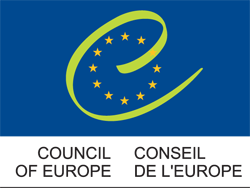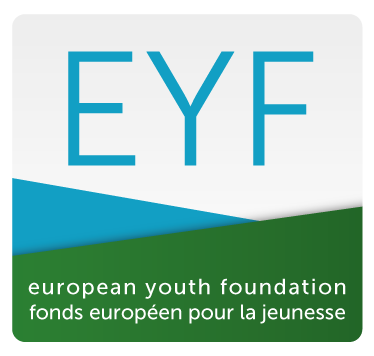Europe
Past Activities
Seminar 2015: LET US IN - KEEPING THE FAITH IN YOU(TH)



.jpg) Thanks to the support of the European Union through the ERASMUS+ Programme and of the Council of Europe through the European Youth Foundation, MIJARC Europe organized a seminar from the 28th to the 31st July 2015 on the topic of youth unemployment. The seminar is one phase of an annual work plan developed by MIJARC Europe in 2016 on the topic of youth unemployment with the financial support of the European Youth Foundation.
Thanks to the support of the European Union through the ERASMUS+ Programme and of the Council of Europe through the European Youth Foundation, MIJARC Europe organized a seminar from the 28th to the 31st July 2015 on the topic of youth unemployment. The seminar is one phase of an annual work plan developed by MIJARC Europe in 2016 on the topic of youth unemployment with the financial support of the European Youth Foundation.
This project is entitled: "LET US IN! - Keeping the faith in you(th)" and it took place in Overisje, Belgium.
Why this topic?
After analysing the actual situation in Europe and the main challenges rural young people are facing nowadays, MIJARC Europe decided to set the topics of youth unemployment and Christian values as priorities of our platform.
.jpg) We have been assisting to a collapsing economic system in Europe which concerns all European citizens, especially young people who struggle to enter the labour market and are facing many obstacles and instability, which jeopardizes their independence and autonomy and leads to frustration and loss of self-confidence.
We have been assisting to a collapsing economic system in Europe which concerns all European citizens, especially young people who struggle to enter the labour market and are facing many obstacles and instability, which jeopardizes their independence and autonomy and leads to frustration and loss of self-confidence.
In what concerns European institutions, we have been witnessing strong commitment towards putting young people at the core of their concerns (e.g. the Youth Strategy, a renewed framework for European cooperation in the youth field; several EU 2020 flagship initiatives targeting young people; the Youth Guarantee initiative) and towards putting pressure on national governments to implement several measures to tackle the issue of youth unemployment.
The Church and Christian communities are seen as strong social and political actors. Young people who have grown up in rural areas have stronger ties to religious institutions and they express stronger commitments to Christian values. Therefore the Church in rural areas has a strong position and can have a positive influence on the young people facing problems with entering the labour market.
What was discussed during the seminar?
The participants to the seminar were 34 young people from 8 different countries: Belgium, Bulgaria, France, Germany, Malta, Macedonia, Portugal and Romania. Throughout the seminar, they were divided in two working groups, each group focusing on specific questions related to youth unemployment.
WORKGROUP 1: Empower the youth to give them a voice
.jpg) The participants in this group focused on institutions and organisations which can help young people overcome youth unemployment, shared their experiences and searched for good practice examples in order to create a critical view on how different stakeholders can influence the phenomenon of youth unemployment. The group created together an image of what the governments, youth councils and civil society's projects can do and they reflected on what they as individuals but also as members of youth organisations can do.
The participants in this group focused on institutions and organisations which can help young people overcome youth unemployment, shared their experiences and searched for good practice examples in order to create a critical view on how different stakeholders can influence the phenomenon of youth unemployment. The group created together an image of what the governments, youth councils and civil society's projects can do and they reflected on what they as individuals but also as members of youth organisations can do.
WORKGROUP 2: EU and local Youth Strategy in integration and policy making
.jpg) In the second groups the participants analysed the policies related to youth unemployment in the rural areas and discussed the role of the church and the governments in the debate about unemployment.
In the second groups the participants analysed the policies related to youth unemployment in the rural areas and discussed the role of the church and the governments in the debate about unemployment.
They discussed different situations in the remote rural areas where there are the biggest problems with youth unemployment, and how dangerous is the massive migration of young people from villages to cities. By using case studies they discovered re-integration and fallback systems at rural level.
What were the results?
After three productive days in which the participants analysed the phenomenon of youth unemployment, discovered the different realities that exist in each country, had meetings with experts and field visits, there was time to ACT. Therefore, the group prepared a public performance in the centre of Overisje and interacted with the locals to find out their opinions about youth unemployment, to raise their awareness on the topic and to test the methods they created. Split in three groups, the young performers invited the people from Overisje to play a lawn game with them, to watch a forum theatre play and to answer several questions about youth unemployment.
.jpg) "Get a job" game - inspired by the lawn game "KUBB", the objective of this game is to raise people's awareness on the different realities of youth unemployment in several European countries. The full description of the game and how to play it can be found here.
"Get a job" game - inspired by the lawn game "KUBB", the objective of this game is to raise people's awareness on the different realities of youth unemployment in several European countries. The full description of the game and how to play it can be found here.
"Get a job... if you can" - forum theatre sketch - The play starts with a young person who is unemployed, begging for money. One person passes by, does not notice the beggar and stumbles because of the few belongings that he/she has next to him. This is the inciting incident and from then the characters can be replaced. We'll let you discover the idea of this sketch here.
.jpg) On the fourth and final day of the seminar the participants wanted to express their common vision about youth unemployment by writing a position paper that would show where we, as MIJARC Europe, stand when it comes to youth and their employment. In the position paper, the participants followed the same methodology used throughout the seminar: SEE - JUDGE -ACT, highlighting the main ideas they discussed and also their proposals to improve the situation. The position paper was sent to all the member movements and it will be approved during our next General Assembly. Its unamended version can be found here.
On the fourth and final day of the seminar the participants wanted to express their common vision about youth unemployment by writing a position paper that would show where we, as MIJARC Europe, stand when it comes to youth and their employment. In the position paper, the participants followed the same methodology used throughout the seminar: SEE - JUDGE -ACT, highlighting the main ideas they discussed and also their proposals to improve the situation. The position paper was sent to all the member movements and it will be approved during our next General Assembly. Its unamended version can be found here.
The participants also created posters and news about the seminar was posted everyday on MIJARC Europe Facebook Page.
A full report of the seminar can be downloaded here.
Coordinating team of the seminar:
.jpg) The seminar was prepared by an international team of 6 volunteers, which was called the Think Tank. The Think Tank included three members of the European Team of MIJARC Europe: Jeroen Decorte (Belgium), Jan Vanwijnsberghe (Belgium) and Thibault Duisit (France). They were joined by Charlene Debrincat (Malta), Johannes Rudinsdorfer (Germany) and Ellen Vermeulen (Belgium). The Think Tank was supported by the Secretariat of MIJARC Europe, represented by Brenda Aerts (Belgium), Alexandra Solomon (Romanian, living in Belgium) and by Florina Potirniche (Romania).
The seminar was prepared by an international team of 6 volunteers, which was called the Think Tank. The Think Tank included three members of the European Team of MIJARC Europe: Jeroen Decorte (Belgium), Jan Vanwijnsberghe (Belgium) and Thibault Duisit (France). They were joined by Charlene Debrincat (Malta), Johannes Rudinsdorfer (Germany) and Ellen Vermeulen (Belgium). The Think Tank was supported by the Secretariat of MIJARC Europe, represented by Brenda Aerts (Belgium), Alexandra Solomon (Romanian, living in Belgium) and by Florina Potirniche (Romania).
Next steps
The participants will write articles and will published their results in the next issue of the InfoEurope. The seminar will continue with the next activity, a training course on youth unemployment, which will be hosted by our new member movement - GUG Malta - and will take place on the island of Gozo, between 27th and 30th July.